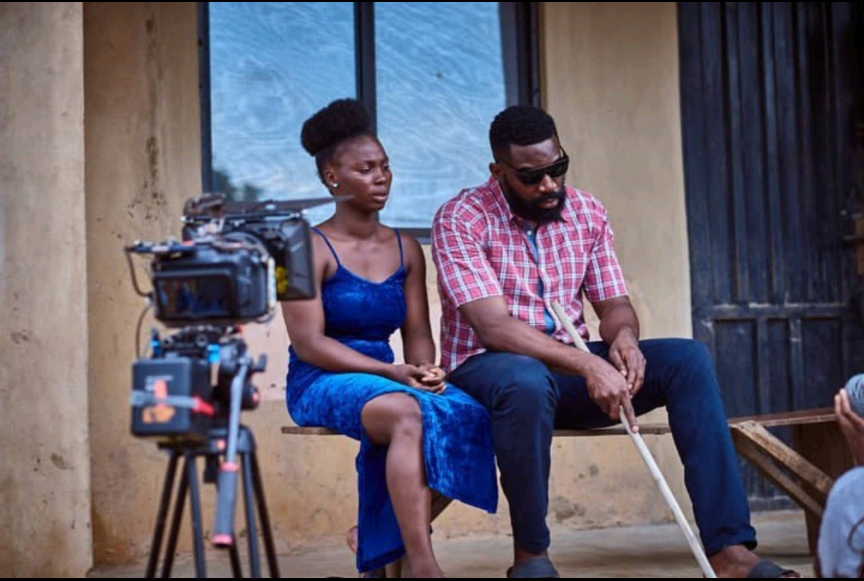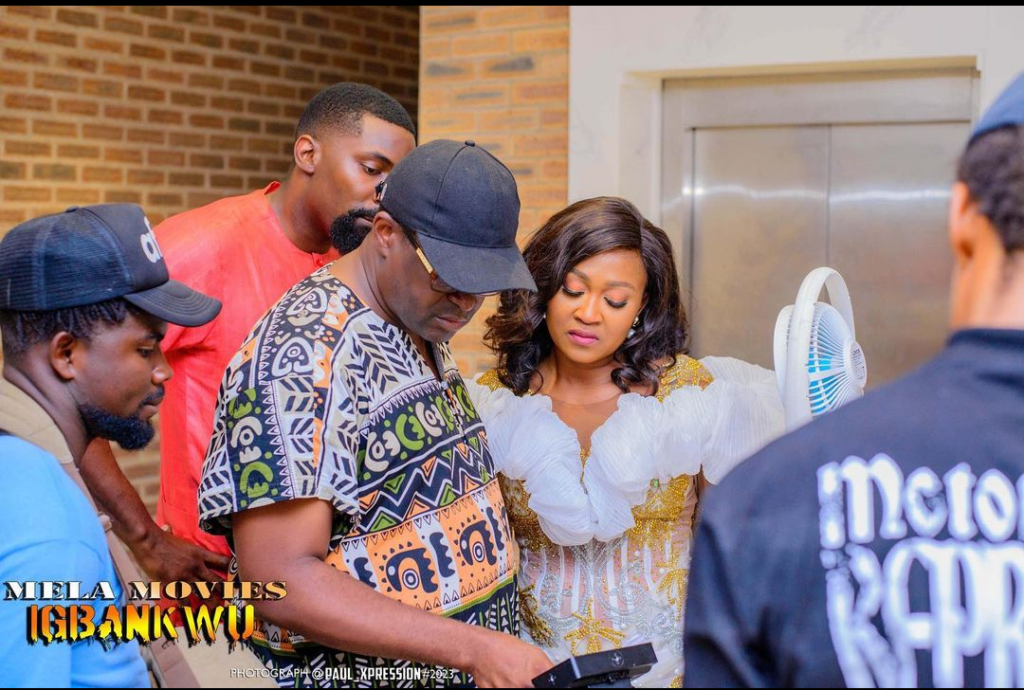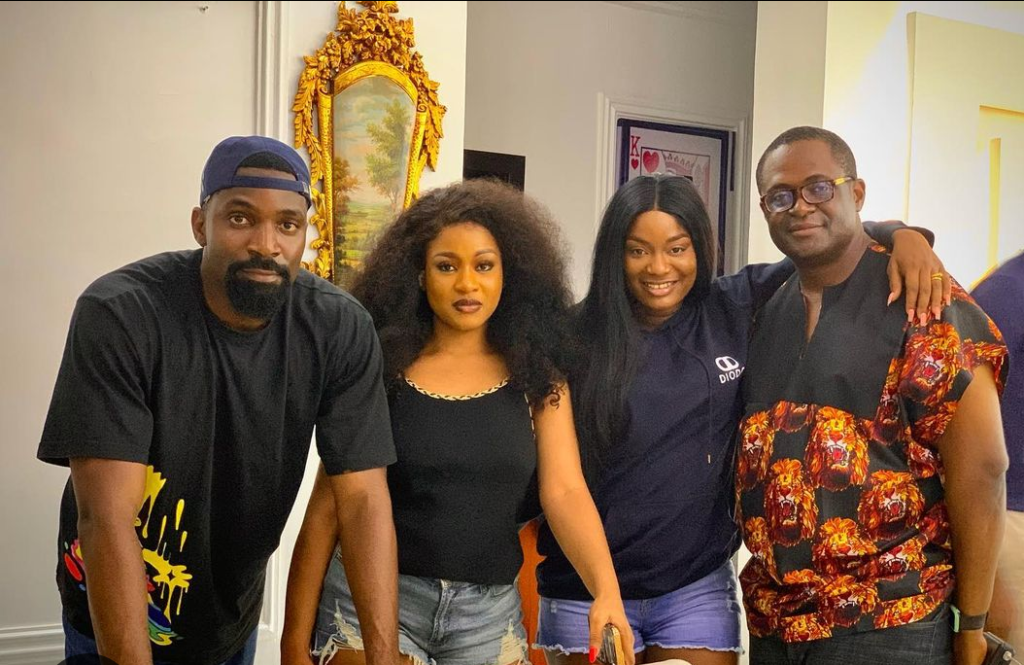“There’s nothing wrong with being typecast, what matters is how well you play that character so that when people think about that role, they think of you.” – Eso Dike
By Helena Olori
Nigeria’s film industry, Nollywood, dubbed the second-largest film industry in the world by volume, has always been a hotbed of raw talent. Since the era of VHS cassettes, inspired by the allure of classic Nollywood films that shaped our childhood and the now nostalgic performances of our favourite actors, many have fantasised about gracing the glitzy screens.
Yet, breaking into Nollywood, unlike the fleeting moments of fame from viral social media posts, is anything but easy. For an industry where talent and qualification do not offer a golden ticket, the journey to stardom is a rollercoaster ride with many twists and turns.
The story of Nigerian actor and on-air personality, Okolocha Esowese Dike, professionally known as Eso Dike, is a testament to the grind and struggles that define the path of aspiring entertainers.
With nearly a decade in the game and more than 50 film credits to his name, the fast-rising Nollywood actor, renowned for his roles in popular titles such as The Smart Money Woman (2021), Ricordi (2021), The Stand Up (2022), Ijakumo The Born-Again Stripper (2022), Now That We Are Married (2023), and so on, now stands as one of the highest grossing actors of 2022.
In a conversation with Afrocritik, the Edo-born actor and a graduate of Law from the University of Benin speaks of his foray into Nollywood, the odd jobs and fluidity that marked his early days, his present momentum, and what is next for the actor.
The name Eso Dike is fast becoming a household name in Nollywood, but not many know you are also a lawyer. Tell us, how do you manage such a diverse professional portfolio as an OAP, model, musician, lawyer, and actor?
To be honest, I haven’t practised law actively in a while. So, I wouldn’t say it is part of what I do currently. Although I have a company I incorporated for law, it is dormant at the moment. For the others, I used to actively do music. I also do photos for some brands sometimes but I wouldn’t say I model. But, for the past 5-7 years, my main focus has been movies, every other thing has taken a back seat. I’m focused on Nollywood and do the best I can there.
Share a bit more about your growing up and how it influenced your decision to pursue a career in the entertainment industry.
I can’t remember the exact time that I decided that I wanted to act, but it is something that for the best part of my life, I knew at some point I would get into. I knew the entertainment industry was for me. I’ve always been art-inclined. The first talent I think I discovered I had was rapping. Then, there was drama club – my mother teaches African literature and drama at the university level, so that has always been something that is there. Growing up, my parents were very liberal in letting me choose and gently guided me in my career choices. Even though I studied law, my mum knew that I was going to try and pursue entertainment afterwards and I was encouraged to do so. So, I would say it is a passion that was encouraged by my folks.
(Read also: From Modeling to Acting, Dark October’s Chuks Joseph Charts His Transition to Nollywood)
Could you share insights into your early days in the entertainment industry?
It was probably one of the hardest things [for me]. My trajectory into entertainment started when I decided to move to Lagos. I was born and raised in Benin, so everything about my early life at that point was centred around Benin, except when I went to law school in Abuja and returned home for a bit. But one day, I just woke up and made the decision. I spoke to my mother about it and told my father I was going to Lagos to see what was happening there. I don’t think he knew I planned not to return. I left, and I’ll tell you, the first few years trying to get into Nollywood were pretty difficult because I did not know anybody. It was my first time in Lagos with no family or close relations in entertainment to guide me. I got to Lagos and immediately started looking for roles. While at it, I got an intern TV gig, because I had worked in a radio station in Abuja at some point and I did some TV presenting. While I was trying to pursue acting, I was using my TV gig to support body and soul. I think, maybe in the first five years of my career in Nollywood, there was no sustainable gig for me because, at that time, most of the gigs I did were for exposure and favours for people hoping they would return it. And with an already established class of actors, it took years to break into the industry. It is only more recently that Nollywood has been, for me, a sustainable career path.

Did you ever think of quitting when the going was tough?
Of course, several times. I took a break. I took several breaks. There was a time when I stopped acting. I started hosting events because the acting wasn’t paying. If I didn’t have my job as a presenter, I would have gone back to my village. My family was also a very good support system. Those first few years were super hard. A lot of the people that I used to go to auditions with in the early days quit. And it is understandable, because when you are trying to do the hustle, nobody is helping you out, and bills are just piling up.
I did a lot of random gigs here and there to make ends meet. People always say if you are in Nollywood, you have to have another job, especially early on, because trust me, it is difficult, and the financial remunerations aren’t the best. I almost left the country, too. And just when my career was starting to blossom, COVID-19 happened. This was the 6th or 7th year of my professional career, when the few projects I had done in 2019 and early 2020 were beginning to see light. It wasn’t the easiest time, I can’t lie. But I tell you for real that patience does pay, and perseverance, too.
From Tsola in The Smart Money Woman to Malik in Ricordi, to the endearing character of Kobe in Grind, your performances across the various productions affirm the versatility of your talent. How do you prepare for these characters?
Preparing for characters is a different process. For me, what I like to do is watch shows/movies with similar characters in terms of how the story goes. In acting school, they teach you how to do background work on your character. But apart from that, I personally like to watch characters that feel like the character that I’m about to play, just to see how another actor brought something else to life. That gives me ideas on what to play with and how to do it. So when I saw Kobe, the first thing that jumped out at me was to make him have coloured hair and painted nails. It just seemed like a very “Kobe” thing to do, especially after discussing it with the writer. I fleshed it out a bit and we moved with that. But the preparation is different for every character.
Now that you’re no longer at that point where you’re desperate for just any role, what would you say draws you on to the character, the roles you’ve taken in both movies and TV series recently?
It depends. Yeah, I’m in a better position to be able to pick roles, it could be better, but it could also be worse. I don’t think I’m there yet, but I’m getting to where I’ll be able to really pick and choose whatever I want. However, it is better than it was a few years ago. For now, it is the character’s range that informs my decision – and obviously, the money and platforms involved.


Your acting, no doubt is remarkable despite being consistently typecast as the “lover/playboy” in multiple films. Does this raise any concerns for you?
I don’t mind. People always talk about typecasting, but I would rather be typecast and have work, than not be typecast and have no work. Even Hollywood actors are stereotyped. Bradley Cooper, for the first 15 years of his career, was a lover boy, same for Matthew McConaughey. But then, you get to a certain position where you are able to select the characters that you play and whatnot. If you look at even versatile actors, you’ll see maybe just a tiny percentage is different, even with Denzel Washington. There’s nothing wrong with being typecast, what matters is how well you play that character so that when people think about that role, they think of you. Again, I’d rather be typecast and have work, than not have work and be, I don’t know, whatever the other option is.
Among your roles, which one do you consider the most challenging, and why?
All roles are challenging in their own way. There was a time I played a blind character, Wonu, in Clearly I See You. Although my character had dark shades on, I would still close my eyes while recording on set just to get more into the role. That was challenging because, for about 95% of that film, my eyes were closed.

Three of the films you featured in 2022 – Ijakumo, The Wildflower, and The Stand Up – collectively grossed over 300,000,000 Naira, which makes you one of the highest-grossing actors in the industry. How does it feel to contribute significantly to the success of Nigerian cinema? What, in your view, fueled their success?
To be honest, last year wasn’t the first time I had gotten into a high-grossing film. According to some publications, I was in the top 20 two years ago or so. But yeah, being part of productions that made decent money feels good. It is on my LinkedIn profile, it is good for them and it is good for me in terms of PR. About their successes? First of all, I think Aunty Biodun Stephen (The Wildflower) is a winning formula in filmmaking. She’s one of the greatest minds in terms of directing in the industry. But also, the cast ensemble also plays a major role in a film’s success. There’s no particular recipe for a successful movie, but you cannot deny the impact of the people involved in the project – from the producer to the cast. You just can’t go wrong with a great crew.
Do you have any favourite people you work with in the industry?
There are a lot of great people I have worked with in Nollywood and there are many more I would love to work with. I have worked with Kayode Kasum, Naz, Zulu, and Damola of InkBlot Productions, among others. As a matter of fact, anybody who calls me up and recommends me for work is my fav. Big shout out to the people who continue to bring me on board projects.
While we were scheduling this interview, you mentioned you were filming a new project. Can you share a hint or two about the upcoming project?
Yeah. The movie is called Igbankwu. I play a lead character alongside Mary Remmy Njoku. It is directed by Okechukwu Oku popularly called Oracle and produced by Mela Movies. The film will be in cinemas next year.


Looking ahead, are there specific goals or aspirations you have for your career in the coming years? Are there any particular genres or types of projects you are eager to explore in the future?
Of course, creatively and otherwise, there are so many things I want to do. I’m in the process, or rather, someone is in the process of writing a film for me. It is my story, but somebody is in the process of writing it for me, to be produced in the first quarter of next year, by the grace of God. That is behind the scenes for me. Moving forward, there are a few people I’ve been wanting to work with — I am blessed to have worked with some of the biggest names in the industry — I still have not worked with Kemi Adetiba and the likes, there is more to come.
Personally, I want to work more on myself, to get better because every once in a while, I take pauses. Last year I took a pause and went to a creative academy just to brush up and get more insights. I’m looking to do that again next year and maybe go to a different place to just brush up on my acting and do a film course. I would love to do an international film. That is a field I’m looking to explore too. I’m looking forward to being my best, to being in my era of dominance.
(Read also: “The Fun Projects are the Most Challenging”: Femi Dapson, on Securing a Spot as a Top Music Video Producer in Nigeria)
For those aspiring to enter the entertainment industry, what advice would you give them based on your own experiences? Do you think versatility is the key factor for success in the Nigerian entertainment industry?
Perseverance. That’s really all it is, more than anything. I would say the biggest thing in the entertainment industry, and maybe anywhere else, is perseverance. You need to look at the long game. Some people are lucky to get in and start getting big gigs, money, or whatever, but that wasn’t the case for me and the majority of the actors. People look at movies on Netflix and think “I can get into this, this looks fun, this looks easy”, and you get into it and realise it is absolutely not. So, you just have to be consistent because Nollywood isn’t as big as most people think, it is also not easy to break through, you’ll need perseverance, dedication, and hard work. Versatility helps of course, I mean it does everywhere. If there’s a range of roles to choose from, it creates an opportunity for you to work. If you look at Hollywood, some people have made great careers by just being comedians alone, they don’t want to be anything else. So whatever your niche is, just be great at it, there are people who have made great “Area Fathers” in Nollywood, there are some people who have made great gatemen, there are people that have made great careers out of niche roles and you can’t even see them in anything else. Being versatile might increase your demands but I don’t think it’s compulsory.
Helena Olori is a talented multimedia journalist, she enjoys staying abreast with the latest happenings in the film industry and what makes the movie business tick. Connect with her on Instagram @heleena_olori or helena.olori@afrocritik.com




